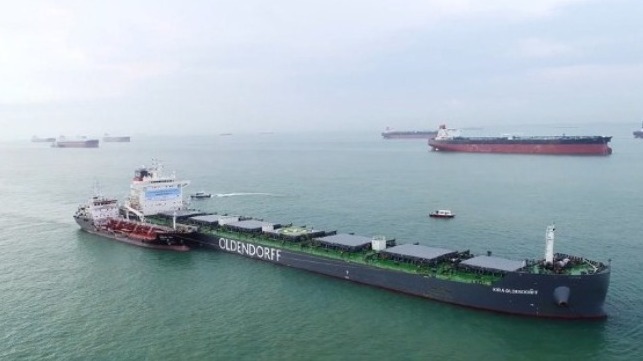Project to Build Quality Assurance Framework to Speed Use of Biofuels

A consortium of 18 companies from the shipping industry led by the Singapore-based Global Centre for Maritime Decarbonisation (GCMD) is launching a project to establish a framework for ensuring the supply chain integrity of biofuels and future green marine fuels. According to the group, the project is “first of its kind in extent and complexity,” building on the previous independent tests of biofuels to provide ship owners and operates greater assurances and accelerate the adoption of drop-in biofuels as a near-term measure to advance decarbonization in the maritime industry.
The research center highlights that the IMO has taken important steps in lowering the regulatory hurdles for the adoption of biofuels. They pointed to recent amendments to MARPOL that eliminate the need to apply for waivers for using fuel blends with up to 30 percent biofuels (B30) for propulsion, and to allow the use of B30. However, they said that there is no industry-wide assurance framework that addresses concerns on the quantity, quality, and GHG emissions abatement of biofuels.
“By facilitating and creating an optimized drop-in green fuels supply chain, this pilot will help to shape national and international standards of biofuels bunkering and lower the barrier for their wider adoption to reduce greenhouse gas emissions from a lifecycle perspective,” said Professor Lynn Loo, CEO of GCMD. “In curating and executing this first-of-its-kind drop-in biofuels pilot, GCMD is positioned to address stakeholder pain points in the complexities of the supply chain of green marine fuels in a meaningful way.”
The project is taking a bottom-up approach by convening like-minded partners across the maritime industry to participate in this pilot. A dozen ships, each equipped with MAN ES’s two-stroke engines, will take part in the project operating from the ports of Singapore, Rotterdam, and Houston. According to GCMD, the ship owners, charterers, and operators participating in the project represent approximately 2,300 vessels across the container, tanker, and bulker segments, and are responsible for transporting 8.4 million TEUs or 80.6 million dwt globally.
“There are so many good elements in this pilot,” commented Unni Einemo, Director of the International Bunker Industry Association (IBIA). “A variety of biofuels and biofuel blends have already been successfully tested, but this comprehensive pilot can help address remaining uncertainties about how these fuels work in practice by getting extensive end-user operational experiences with products involving FAME and HVO, and hopefully also crude algae oil.”
The aim is to optimize the entire supply chain of bunker fuels by building on the learnings of past shipboard trials involving biofuels. Designed through the lens of the shipowner, the project will start with fuel blends involving existing biofuels, such as hydrotreated vegetable oil (HVO) and fatty acid methyl esters (FAME) blended with either very low sulfur fuel oil (VLSFO), high-sulfur fuel oil (HSFO) or marine gas oil (MGO) in blends up to 30% biofuels (B30).
Using BunkerTrace’s digital and synthetic DNA tracing products to track marine fuels from production to vessel propulsion, the pilot will validate the authenticity of sustainable biofuels through molecular verification tests conducted on fuel samples that are collected at numerous identified points along the supply chain. As a result, it will address the traceability of drop-in biofuels from production, distribution, transportation, storage, and bunkering to shipboard application, providing end-to-end supply chain transparency.
Testing laboratories will play a crucial role in evaluating the biofuels and biofuel blends. Among the issues that will be addressed are a detailed quality assessment of biofuels, including ascertaining their shelf life and long-term stability.

that matters most
Get the latest maritime news delivered to your inbox daily.
GCMD also says that the aggregation of demand for biofuels at ports will result in cost savings for shipowners and fuel purchases through optimized use of land-side storage facilities and bunkering vessels and facilitate assessments of GHG emissions abatement on a well-to-wake basis of individual vessels and across fleets. Testing these fuel blends across the container, tanker, and bulker segments traveling on fixed and tramp routes and bunkering at the ports of Singapore, Rotterdam, and Houston under business-as-usual conditions will also demonstrate the compatibility and stability of these biofuels in actual operating environments, thereby strengthening the overall robustness of the assurance framework.
The pilot will commence on August 1, 2022. It is expected to run 12 to 18 months to complete.
